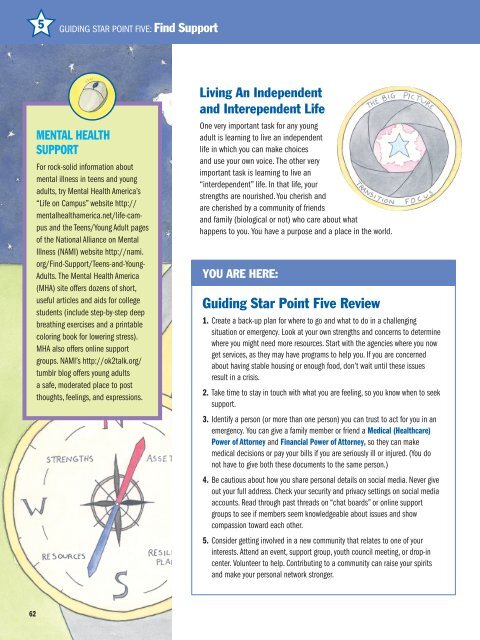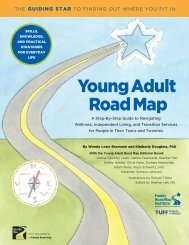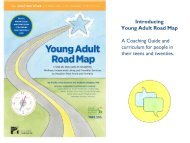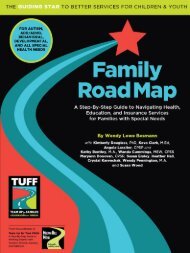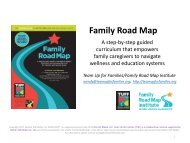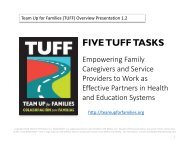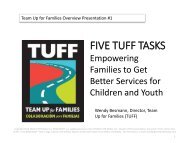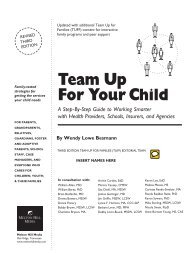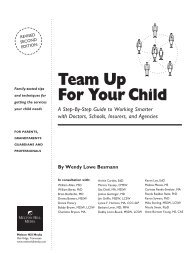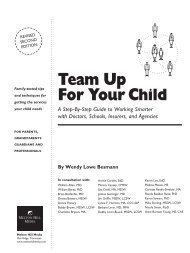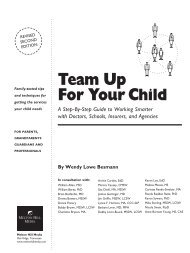Look Inside Young Adult Road Map
Create successful ePaper yourself
Turn your PDF publications into a flip-book with our unique Google optimized e-Paper software.
5<br />
Guiding Star Point five: Find Support<br />
mental health<br />
support<br />
For rock-solid information about<br />
mental illness in teens and young<br />
adults, try Mental Health America’s<br />
“Life on Campus” website http://<br />
mentalhealthamerica.net/life-campus<br />
and the Teens/<strong>Young</strong> <strong>Adult</strong> pages<br />
of the National Alliance on Mental<br />
Illness (NAMI) website http://nami.<br />
org/Find-Support/Teens-and-<strong>Young</strong>-<br />
<strong>Adult</strong>s. The Mental Health America<br />
(MHA) site offers dozens of short,<br />
useful articles and aids for college<br />
students (include step-by-step deep<br />
breathing exercises and a printable<br />
coloring book for lowering stress).<br />
MHA also offers online support<br />
groups. NAMI’s http://ok2talk.org/<br />
tumblr blog offers young adults<br />
a safe, moderated place to post<br />
thoughts, feelings, and expressions.<br />
Living An Independent<br />
and Interependent Life<br />
One very important task for any young<br />
adult is learning to live an independent<br />
life in which you can make choices<br />
and use your own voice. The other very<br />
important task is learning to live an<br />
“interdependent” life. In that life, your<br />
strengths are nourished. You cherish and<br />
are cherished by a community of friends<br />
and family (biological or not) who care about what<br />
happens to you. You have a purpose and a place in the world.<br />
You are here:<br />
Guiding Star Point Five Review<br />
1. Create a back-up plan for where to go and what to do in a challenging<br />
situation or emergency. <strong>Look</strong> at your own strengths and concerns to determine<br />
where you might need more resources. Start with the agencies where you now<br />
get services, as they may have programs to help you. If you are concerned<br />
about having stable housing or enough food, don’t wait until these issues<br />
result in a crisis.<br />
2. Take time to stay in touch with what you are feeling, so you know when to seek<br />
support.<br />
3. Identify a person (or more than one person) you can trust to act for you in an<br />
emergency. You can give a family member or friend a Medical (Healthcare)<br />
Power of Attorney and Financial Power of Attorney, so they can make<br />
medical decisions or pay your bills if you are seriously ill or injured. (You do<br />
not have to give both these documents to the same person.)<br />
4. Be cautious about how you share personal details on social media. Never give<br />
out your full address. Check your security and privacy settings on social media<br />
accounts. Read through past threads on “chat boards” or online support<br />
groups to see if members seem knowledgeable about issues and show<br />
compassion toward each other.<br />
5. Consider getting involved in a new community that relates to one of your<br />
interests. Attend an event, support group, youth council meeting, or drop-in<br />
center. Volunteer to help. Contributing to a community can raise your spirits<br />
and make your personal network stronger.<br />
62


